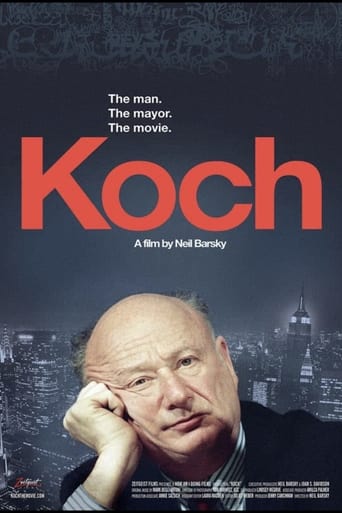

Marking the directorial debut of journalist Neil Barsky, the documentary "Koch" provides us with a comprehensive look at one of the most outspoken, colorful and controversial mayors in New York City history. Ed Koch served in that role for three tumultuous terms, from 1978 to 1989. He continued on as a robust, politically active advocate for the city he loved until his death on February 1, 2013 at the ripe old age of 88 (an event that happened shortly after the release of the movie).The movie begins in 1977, a low point in New York City history, when the city itself was facing bankruptcy, the serial killer known as the Son of Sam was terrorizing the citizenry, and crime and hopelessness were the order of the day. It was into this quagmire of despair and seemingly intractable problems that a comparatively obscure New York congressman named Ed Koch ran for and won the highest office in the biggest city in America. The movie goes on to chronicle the ups and downs of Koch's time in office, his often uneasy relationship with large segments of the black community (charges of racism were not uncommon throughout his career), the emergence of the city from the shadows of bankruptcy under his leadership and the transformation of areas like Times Square from "dens of iniquity" to vibrant centers of tourism and business, bringing life back to the community. The movie also addresses the rumors of homosexuality that dogged Koch throughout his life, sometimes to the detriment of his career as a politician and sometimes not.If Koch could be pigeonholed, he could be most accurately described as a fiscal conservative and a social liberal who believed strongly in gay rights and a woman's right to choose. This dichotomy frequently alienated a number of his natural constituencies, resulting in Koch's reputation for being forceful and courageous and for always being his own man. He also craved the spotlight and was not afraid to let his freak flag fly in pop culture settings, ranging from bit parts in movies (often playing himself) to roles on Broadway and appearances on "Saturday Night Live." In his third term, beginning in the mid '80's, Koch was haunted by a corruption scandal that permeated the city government (crimes investigated by an up-and-coming prosecutor by the name of Rudy Giuliani) and by a gay community that felt Koch was not responding with proper force to the then-burgeoning AIDS crisis. But this term was also marked by Koch's push for affordable housing and a falling crime rate. It was also the period in which he suffered a stroke. Finally, Koch was defeated in his attempt at securing a fourth term as mayor, but, even out of office and despite declining health, he remained ever active and engaged in the affairs of his town.Because Koch died almost immediately after its release, there is obviously no reference to his passing in the movie. It also means that Koch is able to tell his own story in his own words, eliminating the need for a voice-over narrator. And all his friends, critics and colleagues get to speak of him as well in the present tense.Thus, what was originally intended as a tribute has become a moving elegy to a man who, for all his failings, made his mark on the city as few others ever have or ever will.
... View MoreThe film was decent, but nothing special. The problem is that roughly 90 minutes barely skims the surface of what Koch meant to New York City during his three terms as Mayor, and showed very little of his pre-Mayoral life (including his Congressional career), and his post-Mayoral life. As someone who lived in the New York area during much of Ed Koch's three terms, I knew some things about him, and was hoping that I'd learn more. That wasn't really the case. Among the things that I thought were missing were the Howard Beach incident and his fights with Donald Trump. Koch was an extremely colorful, charismatic, and polarizing politician. We see some of that, but not nearly enough.
... View MoreI saw a preview screening of Koch sponsored by the Austin Film Society. It is a excellent documentary that presents an honest human portrait of the iconic larger-than-life one-time New York mayor who came to symbolize his great city. While the recently-deceased Ed Koch cooperated and was extensively interviewed in 2010 for the film, it is neither hagiography or a political hit piece. It is fair-minded and shows Koch as a politician who had great successes and great failures. We see Koch go from a crusading liberal in the 1960s to a more conservative pro-business politician in the 1980s. We hear the criticism of his opponents and the praise of his friends. We see his successes in housing and city finances and his highly controversial actions to close a Harlem hospital and break a transit workers strike. The film is empathetic to the older Koch, but also shows him making unflattering comments. In one scene, he argues with a nephew against efforts to build a mosque downtown near the site of the former WTC. He seems to be siding with highly intolerant forces who took up that cause. He often seems to have problems with the African-American community. Koch was a controversial figure and the film capture him in all his complexity and cantankerousness. For folks who grew up watching Ed Koch the film is a trip down memory lane. I recommend it strongly to fans of political documentaries - whether or not you were a fan of The Mayor.
... View More